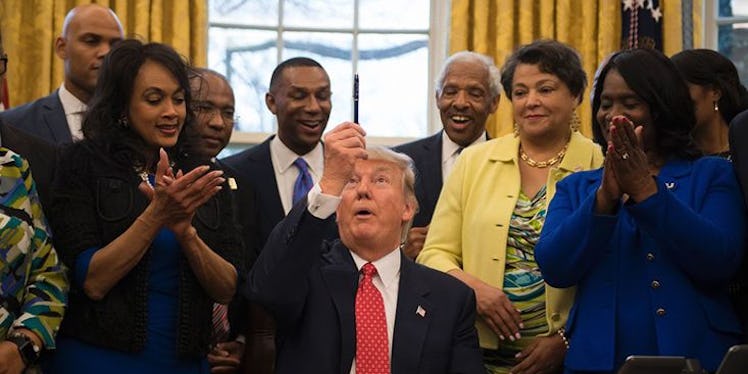
5 Things Every Graduate Needs To Think About With Trump As President
The past graduating season has brought the first class of college grads to exit school during the Donald Trump era.
If you're one of those alums, that's worth noting, too, because of the drastic differences between this president and the last.
Simply put, things are going to be different. While you figure out how to navigate your way through adulthood, there are sure to be lots of policies brought forth by this administration that affect how well you're able to do just that.
It's inevitable, so you might as well be prepared.
Here are some of the main things all college graduates should think about now that there's a new president.
Access to healthcare
If the Republican party and President Trump successfully repeal and replace Obamacare and pass the American Health Care Act (AHCA), a lot of things will change when it comes to how Americans access healthcare, for better or worse.
It just so happens, though, that young people are expected to experience the least drastic changes.
One reason is because Republicans plan to keep the Obamacare provision that allows younger Americans to stay on their parents' health insurance plans up until the age of 26.
That means you can still rely on mom and dad for coverage while you get yourself settled in the real world.
On the flip side, one Obamacare feature that is expected to go away is the "individual mandate." The mandate is essentially the penalty that (typically) younger Americans have to pay if they don't sign up for health insurance.
All things considered, the AHCA is expected to be a good deal the young and healthy already on insurance plans -- although there are longterm issues.
That demographic is expected to have the luxury of staying on their parents' plans and have the option of avoiding signing up for health insurance they feel they might not absolutely need -- although it will be more expensive to get onto a plan if you've been without one for over two months.
Of course, not all young people fit under that description.
For a comprehensive summary for how different groups of people would be affected by the AHCA, check out this guide.
Paying student loans
If you have student loans to pay off, you should expect a bit less generosity from a federal government that, under Trump, is aiming to cut costs.
As of now, the Office of Federal Student Aid offers repayment programs that expect borrowers to pay no more than 10 percent of discretionary income towards students loans. Furthermore, if there's a balance left on these loans after 20 years, the debt can be forgiven.
But if Congress grants the wishes of the White House's recent budget proposal, that cap will now be 12.5 percent for both undergraduate and graduate borrowers.
The 20-year feature would be gone as well. Undergraduate borrowers would pay up to the cap for 15 years, while graduate borrowers would have to pay off their loans for 30 years.
Change could also be coming to the Public Service Loan Forgiveness program. Under that program, people who enter professions such as teaching were eligible for loan forgiveness after ten years of paying their debts on time. The Trump budget proposes cutting the program.
Meanwhile, education secretary Betsy Devos rescinded an Obama-era order to reform the student loan industry. Despite the fact DeVos agreed reform is needed, it's unclear what plans she has to address the issues that the Obama order tried, at least, to confront.
Bottom line, you should study up on how the Trump administration's policies on education financing will positively or negatively affect you.
The environment
It's safe to say President Trump is not a fan of drastic environmental protection measures. On Friday, Trump met with world leaders with who will try to convince him to maintain the United States' participation in the Paris Agreement, an international effort which aims to limit an increase in global warming.
At home, the most dramatic cuts proposed by the White House's newly released budget will come to Environmental Protection Agency, with the budget requesting 31 percent dip in funding.
Add in the fact that President Trump has made a number of executive orders designs specifically to rescind Obama-era orders that sought to protect the environment, and it's clear that subduing climate change will not be a priority of this administration.
With cost of climate change worst possible effects most likely to come down on young people, how the government addresses environmental issues in the near future should be a key concern.
Family planning
Should the AHCA successfully make its way through Congress, there will be a number of implications in this area.
For starters, insurance companies would no longer be required to cover the costs of contraception. That means birth control would once again require out-of-pocket payment for any number of people.
In addition, the GOP healthcare bill would significantly cut government funding of Planned Parenthood, which is in part the reason why access to abortion is expected to decrease.
Furthermore, the costs of pregnancy could increase by an extra $1,000 per month, according to an analysis of the AHCA by the Congressional Budget Office.
All of the aforementioned factors are worth considering for young people who use different measures to time the points at which they want to begin families.
Getting a job
Millennials are saddled with more debt, make less wages than previous generations did at comparable points, and have fewer jobs.
In addition, more young people live with their parents now than at any point during the last century.
With that all in mind, the most important thing to watch for under this president is whether he can fulfill the promise of his campaign's broad, yet key, theme which might affect graduates ability to achieve financial independence: jobs.